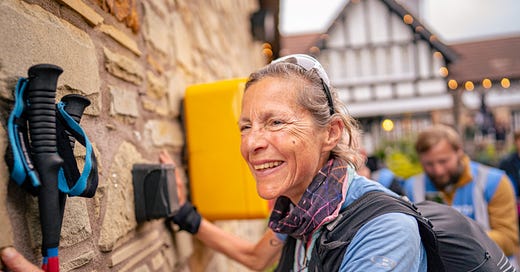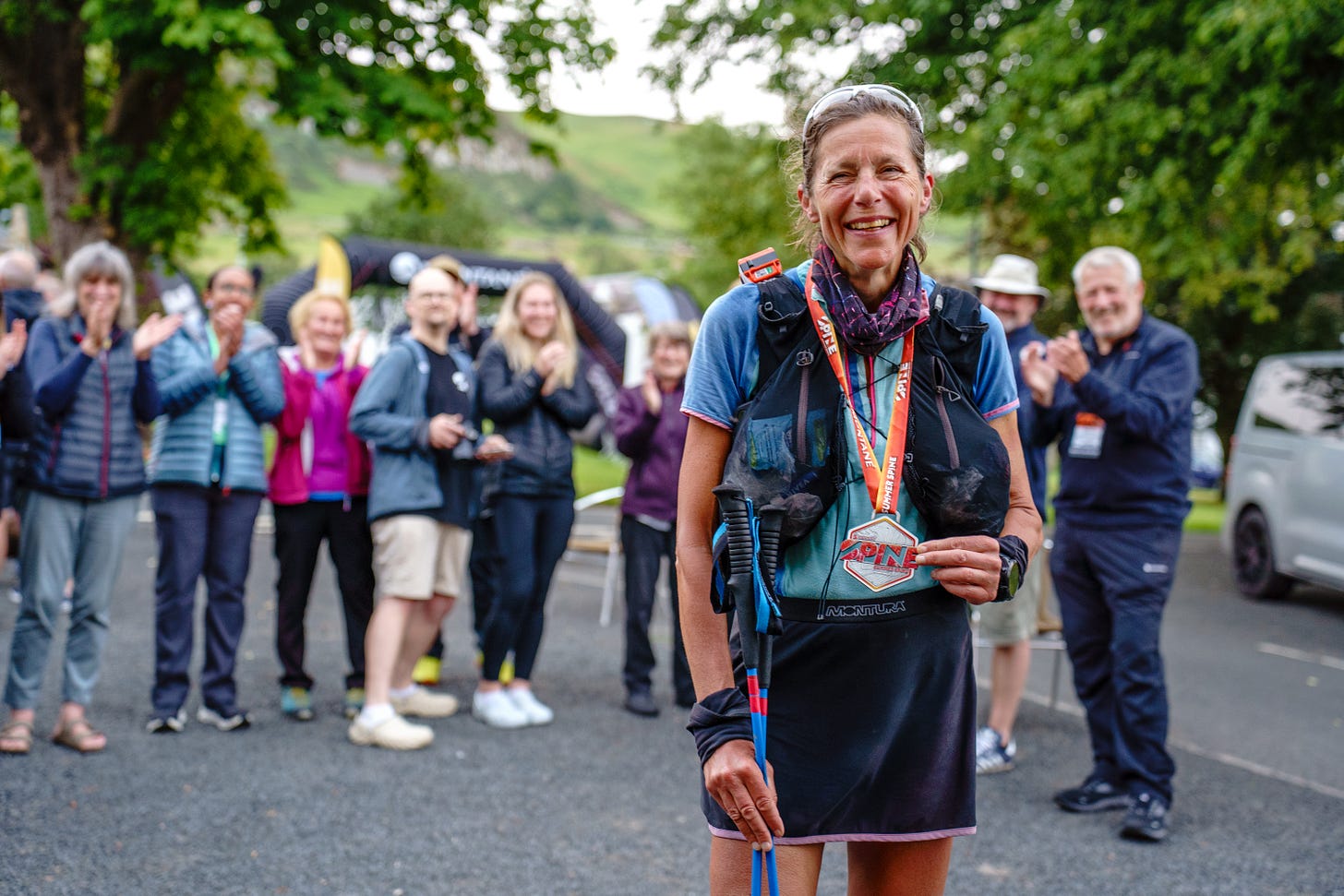How a 55-year-old woman won Britain's toughest ultra marathon outright
Summer Spine race winner Anna Troup on returning victorious after injury
Women dominated the 268-mile Montane Summer Spine race this week breaking history in the process. It was the first time that the top two overall podium positions were held by women.
Brit Anna Troup - aged 55 - crossed the finish line at the Border Hotel in Kirk Yetholm as the outright winner, clocking a phenomenal time of 84 hours, 56 minutes and 37 seconds. Not only did she win the women’s race – she beat every man on the course.
After suffering an injury in 2022 and being told she may never run again, Anna spent three years diligently rebuilding strength and fitness through Watt bike training, hiking and weight sessions.
She only started running consistently six weeks before the race, but took a calm, tactical approach once the Spine was underway, gradually picking her way through the field, overtaking early race leader Jon Shield.
The non-stop ultra marathon travels along the length of the Pennine Way over 10,000m of elevation and is rightly considered Britain's most brutal race.
Hot on her heels, in a remarkable second place overall and second woman, was Dutch ultrarunner Irene Kinnegim (age 50), finishing in 90 hours and 58 minutes, after holding off challenger Shane Morgan over the final 20 miles. After a tough DNF (Did Not Finish) in the 2024 race, Irene returned with one goal: to finish what she started.
The achievements of these two women adds to a growing list of female athletes who have won the winter and summer spine race outright, including Jasmin Paris (winter) and Sabrina Verjee (summer) in 2019.
I caught up with a surprisingly spritely Anna back home in the Lake District to find out just how she managed to come back even stronger after injury.
Congratulations! What an amazing race. Did everything go to plan?
I always start these races conservatively. I figure if you go out really hard, at some point your body will just say, I can't do this anymore. So that was the plan. In all honesty, I felt pretty dreadful. I was really struggling to eat and to drink, which is all fairly standard stuff for me. I knew I was quite a long way behind a lot of ladies. So I was just focused on keeping moving forward, not worrying too much.
I caught up with two other ladies Shirley Murray and Emma Hopkinson and we were able to march up hills very fast, and able to just keep moving really well. So I just stayed and chatted with them, which was definitely not in a plan but it was, was truly lovely. We had a really great night. The three of us just chatting and talking about being mums together.
Emma had to stop at Haughton because her feet were so bad. Later on I left Shirley when she was in a low patch at the third aid station. Being with them allowed me to reset, and my body just then started to be able to eat again, drink again. This is where I really started to catch Irene. When I caught her I just kept pushing on and it really was a question of just moving forward.
I'm not sure you can ever really plan these big races. You have to sort of amend your strategies as you go along. There was a huge amount riding on it for me. I’d been injured for three years and didn’t know if I could finish. I think probably that anxiety all played out in getting absolutely no sleep at all.
As I was coming down towards Alston, I came across Jon Shields and walked with him for three or four miles, at least. By chatting to him, he forgot about his feet briefly, and forgot about his pain. I arrived in Alston 100% fine, full of beans, ready to eat, ready to drink. And then I just headed out. So at that point I was in the lead, that's a good bit of a mental game changer.
But I messed up navigation between Alston and Bellingham, and the course record started to slip away. At Bellingham I had 40 minutes sleep in a chair, that was my only sleep of the race. I just sat in the chair with my head broke down, and then I just set off again. That last bit is awful because you are almost there and not there. But I was focused on getting it done in the light because I don't love being up there in the dark.
By then by brain was definitely not working in quite the way it normally would. And I had to remind myself I was racing. Five miles from the end I was lying face down on the floor with a big rock next to my head after a big fall. So I told myself to just take it steady from there. And then, I was there, at the finish. My foot had held up and I wasn’t broken.
You had won the female race before, how important was winning the overall race?
I was thrilled about winning overall but I always compete against the women, if I'm really honest. But one of the great things about these really long races is that you have to be constantly adapting and strategising. Being the fastest, the strongest, the most powerful doesn't necessarily mean you will win. There’s other factors that come into play. Can you manage yourself? Can you manage the mental side?
I'm 55 and yet these are things that we can keep getting better at and doing well in, whether you're male or female. It’s not really a male or female thing, it's who manages the course best on the day.
Do you think your age and experience gives you an advantage?
It gives you an advantage in some ways and a disadvantage in others. Your base speed is not what it was when you were 30. And you've got a massive, great, chunky rucksack on which, as a female, is weighing probably at least 10% of your body weight, which no one ever talks about. If you're a six foot, five inch male, it's a tiny, bitty pack. But if you're quite a small female, it's quite a chunky thing. So then it also comes down to strength. And most older people start to lose some strength, so you have to focus on keeping some strength.
I also think I have learnt to play the longer game. I was in the middle of the pack at 40 miles. People get so caught up in who's winning at 30 miles, and actually it's who can run the last 30 miles that generally denotes who's going to win. I think over time, you also learn not to panic. You haven't got any water. Well, actually, you're not going to die of dehydration in a few hours. Just crack on. It's not the end of the world, but I think younger athletes sometimes, are so data driven, if they've done something different, it can create a mental block.
How did you manage to return from a stress fracture injury?
I was told I ‘you might do a 10k but you're probably never going to run an ultra. In fact, you may not run at all.’ But I was always on the Watt bike, because I always wanted to stay fit enough, so if I was able to come back and race I would have the fitness. My training has been two hours a day on a watt bike, six days a week, plus two or three sessions of weights. Then I slowly reintroduced some other stuff. From February this year I started building up walking miles, then miles with the pack, and then started introducing some running. I did some little tests like a half marathon and a marathon, and a 50 miler with the pack. But it wasn’t really until six weeks before the race that I was running consistently.
Has your training changed as you’ve got older?
I know as a female of a certain age weights is something I really need to do. It’s not something that gives me great joy, but I know it’s important.
The thing I have noticed the most is recovery from really hard stuff takes a bit longer. I can still do it, but it leaves my legs pretty empty.
You run ultras with your husband. Do your daughters get involved as well?
My daughters (who are now 20 and 22) watched us doing this stuff and said they’d like to do 100 miles. We trained them for a year through hiking. My youngest got really unwell (unrelated to training) and wasn't able to do it. But my eldest daughter did the Javelina Jundred when she was 16. It's given her this massive bedrock of, if I can do 100 miles, I can do anything, all the way through A levels into university.
Thanks for reading this week’s newsletter. Send feedback to lilycanter@yahoo.co.uk or suggest topics you’d like me to cover.







